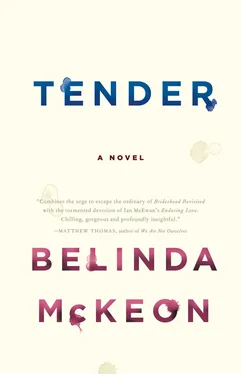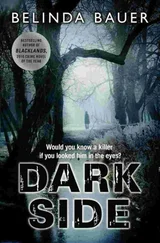Giving it those three long syllables. What would James’s name sound like in that mouth?
She has the mouth.
Those fucking Northern accents: so dangerous. So fucking attractive. How had she not copped at least that before?
Telling her they had been missed at the party. Her and James.
And so that was how James’s name sounded when he said it. Sweet and lifted. Quiet.
She told a lie; she told a lie about James’s father, about how he had been sick at the weekend, about how James had needed to go and see him.
And so had she, obviously. Obviously — and she let the implication hang there, let it sit on the air between them and do its insidious, straining attempt at work — obviously she had needed to go there, as well, with James.
(Cursing herself in the next moment for having caused Liam’s face to become so filled with worry for James; to become so softened by concern for him, so tender with it—)
* * *
“Well, we’ll all have to get a few drinks, now, when these exams are over,” Liam said, once she had assured him that James’s father was fine, now, that there was no cause for alarm.
( Or for caring, she said to herself.)
Yes, a few drinks, Liam was saying; a few drinks after the exams. But Catherine shook her head.
“Well, James is pretty busy,” she said. “I mean, with this exhibition he has coming up at the end of the summer.”
“Oh, aye,” Liam said, laughing as though she had said something funny. “Ah, well, we’ll try. I’ll be around Dublin all summer.”
“Why?”
“Ah, you know, a bit of independence. Up home is fine, ah, but it’s a quiet old spot. You know yourself. Have you something lined up?”
“I’m staying here.”
“Aye, but I mean, like, a job?”
And laughing again when she told him.
“But what kinds of things are you going to write for people? What kind of thing would you write, say, for me?”
* * *
As if a sober star had whispered it
Above the revolving, rumbling city: stay clear.
* * *
“What?!”
“Nothing. It’s nothing. It’s just a line from a poem.”
* * *
And all the time she had been talking to him, she realized afterwards, she had been trying to see it in him. Studying him; staring at him through their conversation, as through a strip of gauze. Trying to see: where was it in him? Was it that softness, that sweetness, in his voice? Was it that slight unsteadiness, always, in his smile? Was it that restlessness in his hands, their constant motion, their darting as he spoke to people? Was it in his brown eyes, the eyes that — yes — she could imagine James finding beautiful? Was it somewhere to be seen, to be read as though it was a kind of notation, in his clothes? In his video-game T-shirt? His baggy corduroys? His scruffy Vans?
And yet, so many of the boys in college dressed just that way—
And no, she could not believe she was doing this. She could not. She could not believe that this was what she was trying to do. That this was what she was, actually. That this was what she had revealed herself to be carrying. That she had so much fooled herself, flattered herself, into thinking that she was good. That she was so open, and so loving, and so all right with everyone, in every way—
Many things in the world have not been named; and many things, even if they have been named…
Because that was what she was looking for, wasn’t it?
Because that was what she was trying, in Liam, to see.
* * *
[EN20011]
UNIVERSITY OF DUBLIN
TRINITY COLLEGE
Faculty of Arts (Letters)
School of English
Senior Freshman Examination
English Studies / T.S.M. Trinity Term 1998
ROMANCE
Saturday, 23 May 1998 Regent House 9:30–12:30
Answer three questions
Candidates are warned against repeating material
Can it be claimed that medieval romances offer a significant comment upon and engagement with reality?
Write on images of divine activity in medieval romance.
“Many romances are so episodically structured that they are more like collections of stories than one story, and consequently often appear to have no overall meaning.” Discuss.
“Description of place in romance can carry all the excitement of furious action.” Do you agree?
“A self-portrayal of feudal knighthood with its mores and ideals is the fundamental purpose of courtly romance.” Discuss Eric Auerbach’s statement.
Write on the importance of episodes and interludes of delay in Romance narrative technique.
How significant is the title…
* * *
Dear Cit-Bag,
EXAMS ARE OVER. Therefore, leave the library at once. The pleasure of your company is requested at Le Pav RIGHT THIS MINUTE for some v.v. pleasant boozing, which will take place on the lawn, in the company of every single other person who attends this university, along with quite a few who do not, beneath the lovely rays of the lovely sunshine.
If you do not come, I will send Aidan to get you.
You are DULY WARNED.
Z
P.S. I know that James is around, because Liam—☺! ☺!—tells me that they bumped into one another this morning—☺! ☺!—so please inform him that the pleasure of his company is also required.
P.P.S. If you do not snog Little Emmet this evening, I will be very cross.
P.P.P.S. I may already be slightly drunk.
* * *
“Just look at them all!” Aidan said, as he walked her down from the library. “It’s like Milton, the fallen angels!”
Green sweep of the cricket lawns. Evening heat of the sun. All the hundreds of people stretched out, free now, drunk and happy and grateful, the whole, glinting summer before them.
Drop your bags. Lose your notes. Buy your cans, and slip off your sandals, and feel the grass cool on your calluses, on your unpainted toes. Sweet smells of several smokings. Lazy strummings of several guitars. Sunburn being nudged back to life on so many faces, freckles springing back to the surface on so many arms.
* * *
And James was already there.
* * *
“Howaya,” he said drowsily, and he waved to her, from where he lay, which was with his head in Zoe’s lap, with Amy on one side, and Lisa on the other, his legs stretched out in front of him, his jeans rolled up. He was barefoot.
“Hiya,” Catherine said, standing over them. Aidan had gone into the bar.
“Sit down, Cath,” Lisa said, patting the ground beside her, and Catherine sat down. Her limbs felt stiff. She did not know what to do with them. Lisa handed her a can.
“I must give you that photograph you took of James that day up in PhotoSoc, by the way,” she said. “I finally developed that roll of film.”
“Oh?” James said.
“Yeah. Most of them were rubbish, but Catherine’s one of you was lovely, actually. Really nice. You look like you’re dreaming, or something.”
“Now, Reilly,” James said, as though this proved some point, and he sat up to take a sip from his own can. “Anything I can do, you can do better.”
* * *
And Catherine could not even look at him. What had he meant by that? Had he meant it as some kind of comment on her? Something snide. She felt sure of it — her heart was pounding with her sureness of it — but she could not understand what it was he had meant; had he intended for her to understand?
But now he was laughing. Reaching across to her, actually, Catherine saw with a start — and touching her. Clasping her.
“Happy anniversary, Reilly,” he was saying, and she was staring at him, her mouth gone dry. Was she losing her mind? What was he talking about? Had he even said it, that thing that she felt quite sure that he had? Happy anniversary? What was he talking about? She stared at the date in her mind, but it meant nothing to her: the twenty-third of May? Was he taking the piss out of her? How drunk was he?
Читать дальше












